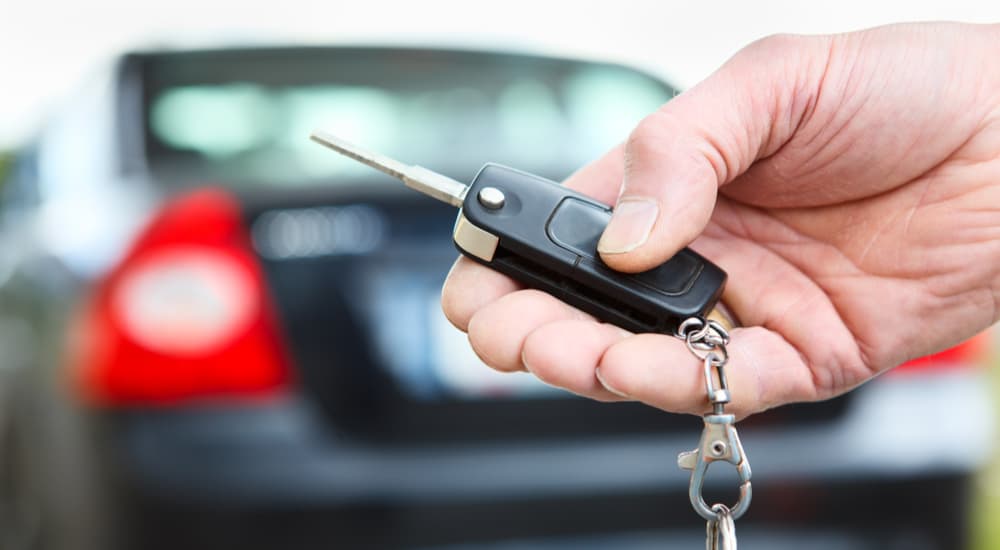The used car market is filled with potential pitfalls for car buyers, but nothing is worse than ending up with a lemon. Reputable dealerships move heaven and earth to avoid selling low-quality cars, but a recent uptick in online car sales through all different types of retailers has reignited interest in extended warranties.
You name it––automotive vending machines, gamified app-based sales––there’s a new gimmick deployed almost daily to hook buyers into completing their car purchases online. Without knowing who is really behind the splashy ads and clever marketing, you could unknowingly buy from a disreputable seller and end up with a poor-quality vehicle and no recourse to fight back.
Even in situations where you’re buying from a trusted online dealership, such as the internet sales arm of an established automotive dealer, it might make sense to spend the extra cash for additional warranty coverage. When should you add an extended warranty, and when is it better to roll the dice? Here’s our guide to the newest warranty products and why they might be a fit for you.
What Is an Extended Warranty?
All new vehicles come with a factory warranty, which means the manufacturer is responsible for the cost of repairs to any components included in the warranty coverage. Warranties are easy to understand for most consumers when it comes to new products, including vehicles, but what happens when the warranty period ends? For many used car buyers, life without warranty coverage is a gamble.
Most new vehicle bumper-to-bumper warranties expire within three years or 36,000 miles. After that, the vehicle’s major components, like the motor and transmission, are covered by a longer-term powertrain warranty. These powertrain warranties typically expire at the five-year mark or when the odometer hits 60,000 miles. Corrosion warranties are also common and can extend up to 10 years or 100,000 miles.
If you’re buying a used car with more than 60,000 miles, it will probably not have any remaining factory warranty coverage, and you should consider adding an extended warranty. Commonly called service contracts, extended warranties offer used car buyers peace of mind. A comprehensive extended warranty will cover all labor, parts, and associated costs if the car requires a major mechanical repair. Best of all, most service centers and body shops will work with major warranty providers, so you can get the work done almost anywhere.
These products act as an extension of the factory warranty coverage, but they’re administered by third-party insurance companies that specialize in automotive extended service contracts. Different types of coverage are available depending on how much you want to pay, which components you want to cover, and the age and mileage of your specific vehicle.

The Good, the Bad, and the Ugly
Extended warranties aren’t all good news because there is the possibility of fraud in the service contract industry. It’s critical to select a product from a reputable seller who can verify that the company underwriting (guaranteeing) your coverage is legitimate and capable of paying claims when you need them. Any established online automotive retailer should have relationships with equally well-established warranty providers.
As you consider your options, use the same logic you would when choosing auto insurance coverage. Most extended warranties require a deductible before they’ll pay a claim. A good rule of thumb is that the higher the deductible you choose, the lower the cost of the policy. Carefully consider what you’ll be able to afford when a repair is necessary. Some buyers choose a higher deductible to save costs upfront, then find themselves scrambling to pay their share of a costly repair.
Another consideration is how long you plan to keep your used car. If you switch cars every two or three years, a long-term extended warranty may not be the best investment. Some warranties are transferable, but many are not. Finally, take a close look at what’s covered. You may want to bring a magnifying glass because the limits of coverage are sometimes extensive, and you’ll want to fully understand the specifics of the service contract you’re buying before handing over payment.
Many long standing dealers have their own service contract options, which can offer a tremendous cost-saving opportunity for buyers. Online buyers who choose to work with an established dealer will have access to the same quality warranty products as in-person buyers. If you’re buying a Certified Pre-Owned (CPO) car, you may even have the option to purchase extended warranty coverage directly from the manufacturer.
When Should You Consider Buying an Extended Warranty?
Which buyers are the best candidates for an extended warranty? If you’re buying a car that’s nearing the end of its factory powertrain warranty or one for which the warranty has already expired, you should seriously consider additional coverage. Though companies like CARFAX offer comprehensive vehicle history reports, you never know what might go wrong with your specific car.
If you regularly buy used cars and hold onto them for more than a few years, an extended warranty makes good sense. As you consider your options, think about the type of issues your car might be facing based on its age and how you plan to drive it. Align the extended warranty with your specific driving habits to ensure the plan covers what you need it to without adding a bunch of extras you might not need, like roadside assistance.
Buyers of Certified Pre-Owned vehicles have a golden opportunity to extend the original factory warranty coverage without involving a third-party warranty company. Most manufacturers offer tiered coverage options depending on the mileage and age of the vehicle. This means dialing in exactly how much coverage you want and for how long is relatively simple, especially since you can build it into the purchase price of the vehicle.
Keep in mind that older vehicles with more miles on the odometer will cost more to cover. Additionally, many warranty providers will consider your driving history when determining the cost of coverage. In that way, service contracts are very similar to automotive insurance, except instead of covering the cost of an accident repair, they cover the cost of mechanical failures.

Do Your Research
As with any consumer product, it pays to do your research before you purchase your used car. Some vehicles cost more to cover, while others may not be eligible for extended warranty coverage at all. Extremely high mileage vehicles or those with extensive aftermarket accessories often won’t qualify. Warranty companies even take resale value and reliability ratings into consideration when setting prices for their policies.
If you’re choosing to buy a car online and you can’t trace the seller back to an established automotive retailer, be extra careful about saying yes to extended warranty coverage. The internet is full of stories about frustrated buyers who can’t get claims approved or who are unable to reach a customer service specialist to help them with their coverage questions.
Also, since the cost of an extended warranty is a moving target, you won’t find a good resource to compare prices across multiple providers. Your best bet is to find a reputable dealer with experience guiding customers through the decision process. This approach has the added benefit of convenience: you’ll likely use their service department for repairs, and as a result, you’ll have fewer issues getting claims approved.
Extended warranties aren’t always scams, nor are they simply designed to line dealers’ pockets with extra cash. In fact, when you select the right warranty for your needs, budget, and vehicle, and you work with a reputable retailer, your extended warranty could be a lifesaver exactly when you need it.



